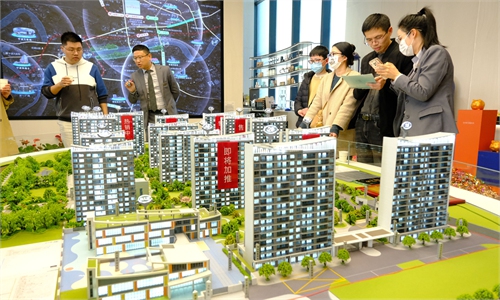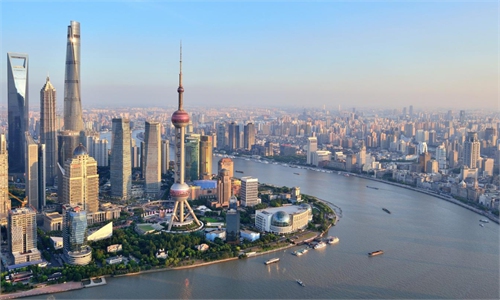
Illustration: Liu Xiangya/Global Times
China's central bank acted aggressively to cut the benchmark five-year loan prime rate (LPR) by 25 basis points to 3.95 percent on Tuesday, marking the largest rate rollback since the LPR system was introduced in 2019 which will ramp up market demand for long-term loans and propel the country's overall economic development.The rate reduction, together with a recent package of pro-growth macro policy announcements, will fuel up two important segments of the economy - the real estate and the stock market. The move will continue to bode well for home-buying and accelerate Chinese equities trading.
With substantive monetary policy easing, market confidence and investor morale have been revitalized and are now on the upswing, as property dealers said that they have received rising visits by potential home-buyers, and China's A-share market has staged a rare eight-day rallying streak by Friday.
Flamboyant investors anticipate the streak will continue into this week. The Shanghai composite stock index soared more than 369 points or nearly 14 percent from February 6, a stellar market performance that reflects the rapidly rising enthusiasm of the investors and the society's rallying confidence in the broad economy. The monetary authorities' intensified effort to phase in a market-oriented, law-based and internationalized oversight system is certain to guide China's capital market into a new era of healthy growth.
Investors are now expecting more encouraging news to come in order to shore up the economic growth.
The annual "two sessions" - the National People's Congress (NPC) and the Chinese People's Political Consultative Conference (CPPCC) - will open in Beijing in early March, and economists and analysts forecast more fiscal stimulus plans will be announced, targeting at investment in infrastructure, technology innovation, manufacturing upgrade and broad social programs, which will further buoy market confidence.
Throughout 2024, capital investment and domestic retail spending will continue to drive China's economic growth. Fiscal policy may likely take the lead, accompanied by firm support from monetary easing, a stabilizing property market, a reactivated capital market, and targeted growths in high-end manufacturing and the expected boom in new-quality productive forces.
Many Chinese economic research institutions and investment houses say the country will aim for around 5 percent GDP growth this year, which may seem like a daunting job in the backdrop of contracting global demand and economic gloom, but highly attainable provided China adheres to the ongoing growth-reinforcing policy choices.
Tuesday's 25-bps five-year interest rate cut, making the home mortgage rate approaching historical lows, is exquisitely heartening for the vast home buyers as they will need to pay substantially less in mortgages. The steep cut will effectively decrease the cost for buying residential properties, and ease the repayment pressure on existing home loans. By all metrics, it is of great importance to enliven the real estate sector from the pandemic-induced doldrums.
The move will also guide commercial banks in China to lower long-term borrowing costs faced by all types of enterprises, the private businesses in particular, which will help stimulate their demand for credit and fire up overall economic activity.
With the exception of a few regions that are still having their first-home mortgage rates above 4 percent, the majority of local home markets will be capable of enjoying a lending rate of below 4 percent, among the lowest rates in the world. In comparison, the average 15-year to 30-year mortgage rates in the US comes in at a range from 6.7 to 7.3 percent.
The rate cut will further inspire buying sentiment in the property market. Major Chinese cities would welcome a post-Spring Festival pickup in property sales, considering the positive effects of the measures already introduced in the first-tier and second-tier cities like Beijing, Shanghai, Suzhou and Guangzhou to lessen previously administrative curbs on property purchases.
At the same time, government departments at all levels are working together to revive the all-importance property market. An urban real estate financing coordination mechanism has been set up across more than 100 cities to strengthen and support the financing needs of real estate projects. According to official statistics, credit to real estate projects exceeding 160 billion yuan ($22.3 billion) has been extended under the mechanisms.
This should remove a major roadblock restraining real estate sector growth as a "white list" of housing developers has been announced and the eligible developers will be able to get bank loans at much easier terms - a significant step aimed at helping them build and deliver pre-sold homes and recapitalize their financial books promptly. More than 8,000 real estate projects nationwide were eligible for property financing, according to data revealed by China's five biggest commercial banks.
The real estate sector has played an outsized role in the Chinese economy. A reviving real estate sector, coupled with a rallying stock market, will strongly accelerate overall social confidence and the ordinary households' sense of wealth gain, which will ratchet up consumer appetite for shopping big-ticket items like cars and home appliances as well as leisure and travel spending. As a result, the overall economy will receive a strong boost in 2024.
The author is an editor with the Global Times. bizopinion@globaltimes.com.cn



